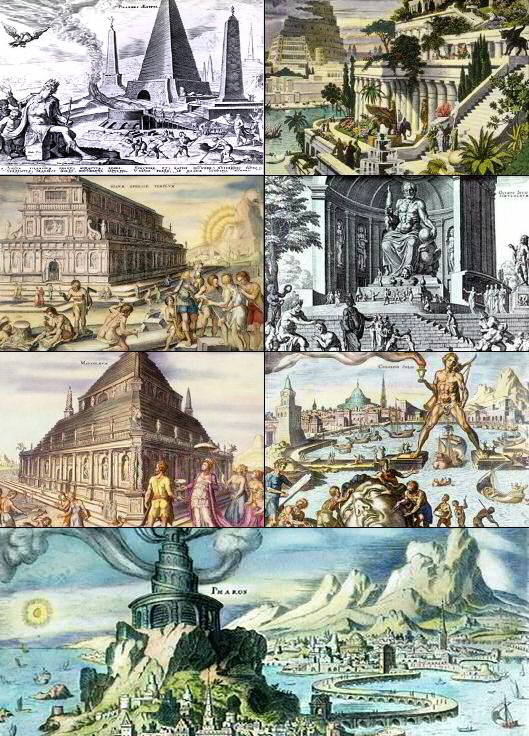
The idea of Wonders of the World came into being in the 4th century BC. Before the Roman empire took over most of Europe, there was a Greek empire. Ancient Greece formed in about the 8th century BC but was basically a collection of city states. Over the next few hundred years, they slowly began to come together. Groups of Greeks started to move to different areas in Europe and created a loosely connected “empire”. In the 5th century BC, these groups were joined together more concretely through the Macedonian empire. Then, in 336BC, Alexander III (Alexander the Great) ascended to the Macedonian throne. He was only twenty years old and he would die thirteen years later, but he pushed the Greek Macedonian empire down into Egypt and all the way across into Southern Asia. It became one of the largest empires in the world.
The size of the empire and its relative safety, encourage Greeks to start travelling. It was relatively easy for people to travel to the Egyptian, Persian, and Babylonian civilizations. And this is where the idea for the seven wonders of the world came from. As Greeks travelled around the known world, they made lists of things that had impressed them in order to tell people when they got home. These lists would have been passed around and added to.
The ancient Greeks didn’t use the word “wonder”. They said “theamata”, which means “sights”. The first lists of wonders of the world were actually lists of sights that ought to be seen. They were basically guidebooks and it was only later that the word “wonder” was used. There is no way of knowing how many “places to see” were in the early lists.
A Greek poet called Antipater of Sidon, appears to be the first person to write about seven wonders. He wrote a poem in 140 BC that lists them all, and he writes as though he has seen all of them with his own eyes.
A Greek historian called Diodorus Siculus mentioned the seven wonders in his forty-volume history of the Greek world. His list differed from Antipater because he talked about the walls of the city of Babylon instead of the lighthouse of Alexandria.
Another Greek author called Philo of Byzantium wrote an account of the Seven Sights of the World at about the same time and his list was the same as Antipater.
All of this shows us that there were more than seven possible wonders and people would argue over which ones should be included on the list for hundreds of years. Some people wanted to include the Egyptian Labyrinth and some people the Ishtar Gate of the city of Babylon. So, why were seven chosen and not eight, or twenty?
Many countries take 7 as a sacred number. It holds an important place in most religions. The Greeks saw the number seven as a symbol of perfection and plenty. This probably began with the Egyptians and came into Greek culture. There were seven sages in Greece. These are the seven philosophers of classical Greece. Seven days in a week. There are seven holes in the human head (2 eyes, 2 ears, 2 nostrils, and a mouth). The Greeks knew of five planets, plus the sun and the moon, which is seven.
Because of this, the list was narrowed down to seven and, despite some argument over the years, the list written down by Philo of Byzantium has become the one that we use.
Only one of the seven wonders is still left today and that is the Great Pyramid at Giza. Interestingly, all seven of the wonders only existed at the same time for 54 years. The last of the seven wonders to be built was the Lighthouse of Alexandria, which was built in 280 BC, and the first of the wonders to be destroyed was the Colossus of Rhodes, which was destroyed by an earthquake in 226 BC. So, that means that anybody that read the list of seven wonders of the world would not actually be able to see them. It is interesting to wonder why the Colossus of Rodes was included when there was no way for anybody to see it.
So, seven wonders of the ancient world were chosen because the Greeks saw the number seven as a special number. Also, the list was more of a guide of places to see than the magical list that it has become in our minds. And this is what I learned today.
If you read this far, I would appreciate a like and a follow.
Photo By Mark22 https://commons.wikimedia.org/w/index.php?curid=3144502
Sources:
https://en.wikipedia.org/wiki/Seven_Wonders_of_the_Ancient_World
https://en.wikipedia.org/wiki/Antipater_of_Sidon
https://en.wikipedia.org/wiki/Diodorus_Siculus
https://www.history.com/topics/ancient-history/seven-wonders-of-the-ancient-world
https://www.quora.com/Why-is-there-only-7-wonders-of-the-world-Why-not-8-or-6
https://en.wikipedia.org/wiki/Philo_of_Byzantium
https://en.wikipedia.org/wiki/Ancient_Greece
https://en.wikipedia.org/wiki/Macedonia_(ancient_kingdom)
https://www.worldhistory.org/The_Seven_Wonders/
https://www.salon.com/2017/08/20/how-we-lost-the-seven-wonders-of-the-ancient-world/
